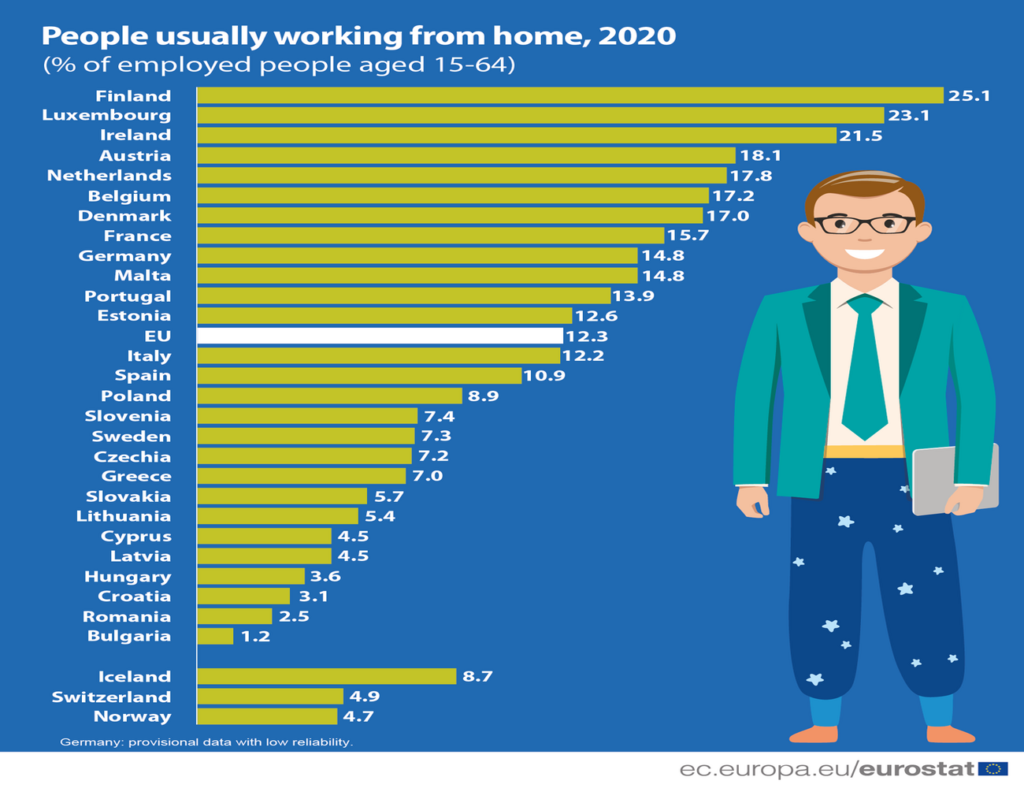The Rise Of Remote Work In Europe: A Comprehensive Guide To Online Jobs From Home
The Rise of Remote Work in Europe: A Comprehensive Guide to Online Jobs from Home
Related Articles: The Rise of Remote Work in Europe: A Comprehensive Guide to Online Jobs from Home
Introduction
In this auspicious occasion, we are delighted to delve into the intriguing topic related to The Rise of Remote Work in Europe: A Comprehensive Guide to Online Jobs from Home. Let’s weave interesting information and offer fresh perspectives to the readers.
Table of Content
The Rise of Remote Work in Europe: A Comprehensive Guide to Online Jobs from Home

The European landscape is undergoing a significant transformation, with the rise of remote work reshaping the traditional employment model. The allure of working from home, coupled with technological advancements and changing societal attitudes, has propelled online jobs into the mainstream. This shift offers numerous advantages for both individuals and businesses, creating a dynamic and evolving ecosystem of opportunities.
The European Context: A Growing Trend
Europe, with its diverse economies and skilled workforce, has embraced remote work with open arms. The European Union (EU) actively encourages the adoption of digital technologies and promotes the development of a digital single market, further fueling the growth of online job opportunities.
Factors Driving the Rise of Remote Work in Europe:
- Technological Advancements: The widespread availability of high-speed internet, reliable video conferencing tools, and cloud-based software has made remote work a practical reality for a vast majority of professionals.
- Changing Work-Life Balance Preferences: Individuals are increasingly seeking flexibility and control over their work schedules, leading to a surge in demand for remote positions.
- Environmental Considerations: Remote work can contribute to reduced commuting and carbon emissions, aligning with growing environmental concerns.
- Economic Benefits: Companies can access a wider talent pool, reduce office costs, and enhance productivity by adopting remote work practices.
- Government Initiatives: Many European governments are promoting remote work policies and providing financial incentives to businesses that adopt these practices.
Diverse Opportunities: A Spectrum of Online Jobs from Home in Europe
The realm of online jobs from home in Europe is vast and diverse, catering to a wide range of skills and interests. Here is a glimpse into some prominent categories:
1. Digital Marketing and Content Creation:
- SEO Specialists: Optimize websites and content for search engines, driving organic traffic and improving online visibility.
- Content Writers: Create engaging and informative content for websites, blogs, social media platforms, and other online channels.
- Social Media Managers: Manage social media accounts, engage with audiences, and build online communities.
- Digital Marketers: Develop and execute marketing campaigns across various digital channels, including search engine marketing (SEM), email marketing, and social media marketing.
2. Customer Service and Support:
- Virtual Assistants: Provide administrative, technical, or creative support to clients remotely.
- Customer Service Representatives: Handle customer inquiries, resolve issues, and provide support via phone, email, or chat.
- Technical Support Specialists: Troubleshoot technical issues, provide software training, and offer remote IT support.
3. Programming and Software Development:
- Web Developers: Build and maintain websites and web applications using various programming languages and frameworks.
- Software Developers: Design, develop, and test software applications for different platforms.
- Mobile App Developers: Create mobile applications for smartphones and tablets using various programming languages and tools.
4. Finance and Accounting:
- Bookkeepers: Maintain financial records, process invoices, and prepare financial statements.
- Accountants: Analyze financial data, prepare tax returns, and provide financial advice.
- Financial Analysts: Research and analyze financial data to make investment recommendations.
5. Teaching and Education:
- Online Tutors: Provide personalized instruction to students in various subjects and academic levels.
- Online Teachers: Deliver online courses and workshops in diverse fields, from language learning to professional development.
- Educational Content Creators: Develop online learning materials, including videos, interactive exercises, and assessments.
6. Freelance Writing and Editing:
- Copywriters: Create compelling and persuasive copy for websites, marketing materials, and advertisements.
- Technical Writers: Develop user manuals, technical documentation, and other instructional materials.
- Editors: Review and edit written content for grammar, style, and clarity.
7. Design and Creative Arts:
- Graphic Designers: Create visual concepts, logos, illustrations, and other visual elements for websites, marketing materials, and print publications.
- Web Designers: Design and develop user interfaces for websites, ensuring a visually appealing and user-friendly experience.
- UI/UX Designers: Design user interfaces and user experiences for websites, mobile applications, and other digital products.
8. Translation and Interpretation:
- Translators: Translate written content from one language to another, ensuring accuracy and fluency.
- Interpreters: Translate spoken language from one language to another, providing real-time communication in various settings.
9. Data Entry and Administration:
- Data Entry Clerks: Input data into computer systems, ensuring accuracy and efficiency.
- Administrative Assistants: Provide administrative support to individuals or businesses, including scheduling appointments, managing emails, and preparing documents.
10. Sales and Marketing:
- Telemarketers: Contact potential customers via phone to promote products or services.
- Sales Representatives: Generate leads, build relationships with clients, and close sales deals.
- Marketing Consultants: Provide strategic marketing advice and support to businesses.
Navigating the Online Job Market: Tips for Success
- Identify Your Skills and Interests: Determine your strengths and areas of expertise, and explore online job opportunities that align with your passions.
- Develop a Strong Online Presence: Create a professional online portfolio, showcasing your skills and experience through websites, social media profiles, and online platforms.
- Network and Connect: Engage with other professionals in your field, attend online events, and join relevant online communities to build your network.
- Refine Your Resume and Cover Letter: Tailor your resume and cover letter to each specific job application, highlighting relevant skills and experience.
- Master Online Interviewing Techniques: Prepare for video interviews, practice your communication skills, and research the company and the role thoroughly.
- Stay Updated on Industry Trends: Continuously learn new skills, stay informed about industry advancements, and adapt to the evolving digital landscape.
FAQs: Addressing Common Questions
1. What qualifications are required for online jobs from home in Europe?
Qualifications vary depending on the specific job role. However, many online jobs require strong communication skills, proficiency in English or other relevant languages, and a good understanding of digital tools and technologies.
2. How do I find legitimate online jobs from home in Europe?
Reliable sources for finding legitimate online jobs include reputable job boards, freelance platforms, company websites, and online job aggregators. Exercise caution with unsolicited job offers and avoid scams.
3. What are the legal considerations for working from home in Europe?
It is essential to understand the legal requirements for self-employment or working remotely in your specific country. Consult with legal professionals or government websites for guidance on taxation, employment contracts, and social security.
4. What are the challenges of working from home?
Challenges include maintaining focus and productivity, managing time effectively, setting clear boundaries between work and personal life, and staying connected with colleagues and clients.
5. What are the benefits of working from home?
Benefits include flexibility, work-life balance, reduced commuting time, and the ability to work from anywhere with an internet connection.
Conclusion: Embracing the Future of Work
The rise of online jobs from home in Europe represents a significant shift in the way we work, offering a multitude of opportunities for individuals and businesses alike. By embracing the evolving digital landscape, individuals can access a wide range of fulfilling and flexible career options, while businesses can tap into a global talent pool and enhance their productivity. As technology continues to advance and societal attitudes evolve, the future of work in Europe will undoubtedly be shaped by the growing prominence of online jobs from home.




![Remote Work Statistics Europe (2023) [100% Updated]](https://zoets.b-cdn.net/wp-content/uploads/2023/02/What-Percentage-of-Europe-Is-Working-Remotely.jpg)


Closure
Thus, we hope this article has provided valuable insights into The Rise of Remote Work in Europe: A Comprehensive Guide to Online Jobs from Home. We thank you for taking the time to read this article. See you in our next article!
You may also like
Recent Posts
- Navigating The Digital Landscape: Online Job Opportunities For 17-Year-Olds
- Navigating The Amazon Ecosystem: Online Opportunities For Students
- Navigating The Digital Landscape: Online Jobs In Illinois
- Navigating The Realm Of Remote Work In Malta: A Comprehensive Guide
- The Rise Of Remote Work: A Comprehensive Look At Online Jobs In America
- Unlocking Opportunities: Online Tutoring As A Career Path For Women
- The Rise Of Remote Work: A Comprehensive Guide To Online Jobs From Home In The USA
- The Digital Frontier: Navigating Entry-Level Online Jobs Without Prior Experience

Leave a Reply